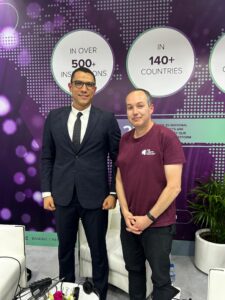Usama Elsayed, Managing Director for the MEA Region at BPC 
Usama Elsayed, Managing Director for the MEA Region at BPC, discussed the ongoing digital transformation in payments across the Middle East and Africa (MEA) region. He highlighted the rapid pace of change and increasing consumer expectations driven by greater digital literacy. While progress has been made, particularly in consumer services, Elsayed stressed that there remains significant potential for growth in areas such as B2B digitisation and SME operations. He emphasised the need for enhanced support for merchant automation, including better tools for cash flow management and financing.
Addressing the regional diversity, Usama noted that MEA comprises both highly advanced and underserved markets. BPC’s broad technology portfolio allows it to cater to this spectrum—from digital currencies and closed-loop systems in sophisticated markets to e-wallets and agency banking in underserved areas.
On the topic of risk associated with rapid digitalisation, Usama acknowledged that fraudsters are becoming increasingly sophisticated. He underscored the importance of integrating fraud management with automation, leveraging AI to detect abnormal transaction patterns and safeguard consumer trust.
Looking to the future, Usama recommended that financial service providers continue to invest in emerging technologies, particularly AI, to enhance fraud detection and customer behaviour analysis. He also advocated for the modernisation of legacy systems, urging financial institutions to adopt next-generation solutions that can keep pace with the evolving landscape.
Saif Khan, Enterprise Digital Transformation at Emaar
Saif Khan, Enterprise Digital Transformation at Emaar, shared insights into his professional background and current priorities. With a longstanding career in digital transformation across retail, automotive, and now real estate, Saif emphasised his consistent focus on enhancing customer experience and integrating complex systems. His experience has been shaped by strong mentorship and involvement in impactful projects.
At Emaar, Saif’s primary objective is to unify and streamline the organisation’s diverse and siloed digital systems, aiming to create a cohesive internal ecosystem. This involves consolidating around two central platforms—ERP and CRM—thereby reducing reliance on fragmented solutions and unnecessary automation. He noted that many organisations in the UAE underutilise their ERP systems and stressed the importance of fully leveraging these investments.
Success, in his view, would mean decommissioning redundant systems to save costs, increasing productivity, and improving analytics. Ultimately, this transformation is expected to benefit Emaar’s customers by delivering faster, more seamless service across all channels, although noticeable changes for clients may not occur until a later stage.
Saif also discussed the payment landscape at Emaar, highlighting the variety of options currently available, including online payments, cheques, and kiosks. He indicated ongoing research into integrating cryptocurrencies as a potential future payment method, subject to regulatory compliance.
Overall, Saif ‘s approach reflects a strategic effort to build a robust digital foundation that supports both operational efficiency and enhanced customer experience.
Adil Belhouari, Senior Vice President and Head of AI Analytics and Data Science at Riyad Bank 
Adil Belhouari, Senior Vice President and Head of AI Analytics and Data Science at Riyad Bank, discussed the bank’s Centre of Intelligence, which he leads. This centre, launched the previous year, is the first of its kind within the bank and is dedicated to harnessing cutting-edge technologies such as artificial intelligence, data science, and analytics. The objective is to generate value across the bank’s activities while aligning with its strategic goals. Belhouari noted that the centre has already begun to deliver tangible results.
He explained that technologies such as big data, IoT, virtual reality, and digital transformation are fundamentally reshaping how financial institutions make decisions and engage with customers. He emphasised that intelligence—particularly AI and analytics—is the key differentiator for organisations aiming to lead in innovation and customer experience.
Addressing the often-perceived conflict between innovation and risk management, Adil asserted that these should not be seen in opposition. At Riyad Bank, innovation is integrated with governance through a comprehensive framework that includes ethical AI standards and regulatory compliance. He stressed the importance of embracing experimentation, even when it involves risk.
Looking ahead to the future of payment systems, Adil identified embedded finance, fintech, and agentic AI as the primary drivers of transformation. He highlighted the significance of open finance and the development of APIs to facilitate seamless integration across platforms, enabling better service and more efficient payment solutions.
Regarding future priorities, Adil outlined Riyad Bank’s focus over the next 18 months: advancing generative AI, conversational AI, and agentic AI to deliver hyper-personalised services. These will include “next best offer” and “next best action” capabilities. Additionally, the bank aims to enhance fraud prevention, risk management, and dynamic pricing using data-driven technologies, supported by the Centre of Intelligence.
Kareem Abdel-Rahman, Head of Global Transaction Banking at QNB Egypt 
Kareem Abdel-Rahman, Head of Global Transaction Banking at QNB Egypt, shared his vision for the future of trade finance in the Middle East and Africa during an interview at Seamless. He divided the concept into two parts: the future of trade and the future of finance. Abdel-Rahman argued that traditional methods—such as B2B meetings and trade exhibitions—are no longer sufficient. Instead, he proposed the development of a region-specific digital trade finance ecosystem, akin to China’s Alibaba, to connect exporters with international buyers.
On the finance side, he noted that traditional trade finance instruments, such as letters of credit and documentary collections, are outdated and cumbersome. He advocated for modern, more efficient alternatives such as Bank Payment Obligations and Digital Undertakings facilitated through blockchain platforms.
Kareem elaborated on his vision for a MENA-Africa-wide e-commerce system, describing it as a trusted B2B platform that would include buyers, sellers, logistics providers, insurers, and banks. He emphasised the need for a unified infrastructure embraced by all regional stakeholders.
When asked about the key technologies banks should focus on by 2025 in the context of trade finance, he identified three priorities. Firstly, artificial intelligence for data analysis, risk assessment, and opportunity identification—while ensuring data privacy. Secondly, blockchain technology to connect all parties within the trade ecosystem. He emphasised that successful implementation requires collaboration beyond the banking sector, involving governments, logistics, and customs authorities.
On Egypt’s potential to lead digital trade finance, Kareem highlighted several strengths: its strategic location between East and West, the Suez Canal, significant government investment in infrastructure, and a youthful, innovative population exceeding 100 million. He asserted that with strong regional collaboration, Egypt is well-placed to play a leading role in the future of digital trade finance in the region.
Abdelraouf Hussein, CEO of Smart Cards Applications Company (SCAC)
Abdelraouf Hussein, CEO of Smart Cards Applications Company (SCAC), introduced the company as a key processor in Egypt’s closed-loop payment ecosystem, particularly for government social benefits such as bread distribution and food stamps. Operating since 2005, SCAC serves over 60,000 merchants and processes approximately 13 million transactions daily. The company is now expanding its role by becoming a licensed payment facilitator and aggregator, aiming to open its POS network to broader payment services, including bill payments via its subsidiary, Damen.
Abdelraouf highlighted the Central Bank of Egypt’s vision as the key driver behind the country’s rapid payment sector transformation. The licensing of numerous payment aggregators and facilitators has significantly expanded merchant coverage, growing from 140,000 in 2019 to over 1.1 million. The launch of Egypt’s local card scheme also enabled banks to issue more affordable cards to segments such as pensioners and salaried workers, further accelerating the shift towards digital payments.
He also noted the growing impact of wallets and Instapay, the latter being a person-to-person payment platform that has gained substantial popularity due to its simplicity and convenience—users can make payments without requiring a POS terminal, sending money directly to cards, wallets, or bank accounts.
In terms of technological advancements, Abdelraouf pointed to the recent enablement of Apple Pay on POS systems in Egypt, with Samsung Pay expected to follow. He also mentioned the potential of Soft POS technology, which could offer a more flexible and accessible alternative to traditional terminals.
Looking ahead, SCAC’s key focus over the next 12 to 18 months is on launching its services as a payment facilitator and aggregator. The company also plans to enhance its cash-in and cash-out capabilities using its extensive merchant network—complementing services like Instapay by offering consumers more accessible cash handling options outside of traditional ATMs. These initiatives aim to reposition SCAC as a leading player in Egypt’s evolving digital payments landscape.
Rob Silsbury, Vice President of Marketing and E-commerce at Alshaya Group 
Rob Silsbury, Vice President of Marketing and E-commerce at Alshaya Group, discussed key challenges and strategies around customer journey excellence, e-commerce growth, and payments during his appearance on the podcast. Having spoken at a keynote session, Rob reflected on how buzzwords such as AI and hyper-personalisation often come and go in cycles, frequently lacking practical application. He emphasised the enduring importance of common sense and actionable value in delivering effective customer experiences, rather than chasing trends for their own sake.
Addressing the e-commerce landscape, Rob noted that while Alshaya’s ambition is high, speed of execution remains a challenge. He stated that the aim is not only to increase the share of online business but to grow the entire business holistically. He observed that the Middle East has significantly closed the gap with Central Europe in terms of e-commerce sophistication, particularly post-COVID, and even leads in areas such as delivery and service expectations. Alshaya’s approach to omnichannel retail acknowledges that customers no longer distinguish between online and offline—they simply buy. The focus, he said, must be on joining the dots and understanding the digital estate’s influence on in-store footfall.
On the topic of customer experience, Silsbury expressed scepticism towards the term “hyper-personalisation,” cautioning that excessive or poorly executed personalisation can become counterproductive. He stressed the importance of tailoring experiences with respect to the diverse markets in the Middle East, particularly given linguistic and cultural nuances.
When it comes to payments, Rob confirmed that Alshaya offers a full suite of options—buy now, pay later, cash on delivery, major credit cards, Apple Pay, and more. Their priority is to offer seamless payment options that suit customer preferences while avoiding unnecessary clutter or duplication. A major area of focus is integrating digital wallets into Alshaya’s Aura loyalty scheme, aiming to make transactions more effortless across their diverse brand portfolio.








